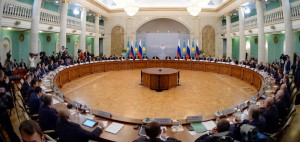The presidents of Kazakhstan and Russia launched a new hydrocarbon development initiative as they met in Atyrau, Kazakhstan on Sept. 30.
 President of Kazakhstan Nursultan Nazarbayev met with Russian President Vladimir Putin at the 11th annual Interregional Cooperation Forum between the two countries, which focused on innovation in the oil and gas industries. Officials from Kazakhstan’s 14 regions and their Russian counterparts, as well as approximately 60 companies from both countries attended the event.
President of Kazakhstan Nursultan Nazarbayev met with Russian President Vladimir Putin at the 11th annual Interregional Cooperation Forum between the two countries, which focused on innovation in the oil and gas industries. Officials from Kazakhstan’s 14 regions and their Russian counterparts, as well as approximately 60 companies from both countries attended the event.
Speaking at the event, President Nazarbayev stressed the importance of the oil and gas industry for the economy of Kazakhstan, which is ranked 12th in the world in oil reserves and is among the top 20 countries in terms of gas reserves. In this regard, Nazarbayev noted the importance of having modern trends shape the hydrocarbon sector.
“Since last year, the balance of oil consumption has shifted to emerging economies. For the first time in history, oil consumption in developing countries has exceeded consumption in OECD [Organisation for Economic Cooperation and Development] countries. The main trend of the last few years in the petroleum sector also has been the development of shale deposits. Modern technologies of horizontal drilling and hydraulic fracturing allow for production of both gas and oil,” Nazarbayev said.
One of the most important topics discussed at the forum was the newly developed Eurasia project, which was launched in a symbolic ceremony by the heads of the two countries. The project will explore innovative approaches to hydrocarbon exploration. “The main objective of this project is the study of the deep geological structure and geochemistry of the earth’s crust in the Caspian region, obtaining a space-time model and resource estimate. The huge oil and gas potential of the Caspian Basin in Kazakhstan and Russia are of great interest among the major international oil companies,” the Kazakh President continued.
Energy is paramount in today’s global agenda, and the Caspian region is strategic in matters of oil and gas production for both Kazakhstan and Russia. Nazarbayev stressed that “now, more than ever, it is important to work together to protect ourselves from geopolitical threats, in particular, in the field of transporting gas.”
Other bilateral agreements signed at the forum included descriptions and extraction terms for the economic activities in the border area of the Vesenne-Aralchinsk copper-pyrite ore deposit and the use of radio spectrum in the Baikonur complex. Regional cooperation agreements on trade and economic, scientific and technical and cultural cooperation were also signed between the akimat (local government) of Atyrau region and the government of Bashkortostan and the government of Tatarstan, two constituent republics within Russia.
Another important announcement made at the forum was that Russia and Kazakhstan will jointly build a nuclear power plant in Kazakhstan. According to an intergovernmental agreement initialled in Atyrau on Sept. 30 by Kazakhstan’s Minister of Energy Vladimir Shkolnik and Russia’s Rosatom Chief Executive Officer Sergey Kirienko, the location, power output and the dates of construction of a power plant will be determined in the future contract. The location has not been determined yet, according to Shkolnik, although Kurchatov, the former centre of the Semipalatinsk nuclear test site in the east of Kazakhstan, has been named as one of the most probable locations.
President Putin remarked, “Over the past 11 years, the economic ties between the two countries have reached a qualitatively new level. Bilateral trade increased more than six times. The volume of direct Russian investment in Kazakhstan increased by 10 times. These high dynamics are greatly facilitated by the interaction of investment in our economies.”
“Direct partnerships with all 14 regions of Kazakhstan have been established by the majority of Russian territorial entities,” he continued. “This has created more than 11,000 joint ventures. About 300 interregional agreements on cooperation have been signed. Russia and Kazakhstan have the longest land border in the world. Forty percent of bilateral trade is created by the regions along this border.”
Russian Energy Minister Alexander Novak, Governor of Orenburg Region Yuriy Berg, President of Bashkortostan Rustem Khamitov, Minister of Energy of Kazakhstan Vladimir Shkolnik, Akim (Governor) of Atyrau Region Baktykozha Izmukhambetov and Akim (Governor) of Aktobe Arkhimed Muhambetov made their presentations at the forum, among others.
The next Interregional Cooperation Forum will be held in 2015 in Ufa, Russia.

